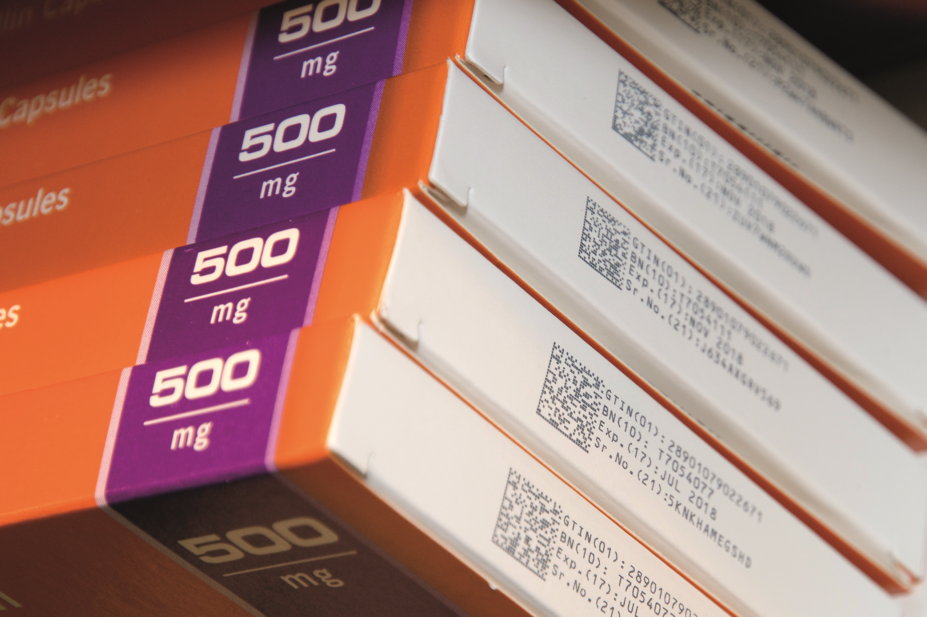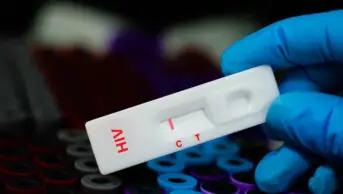
Jonathan Buisson / UK FMD Working Group
On Saturday 9 February 2019, the Falsified Medicines Directive (FMD) will go live across Europe. On that date, the entire pharmacy sector will be expected to adhere to FMD — formally known as Directive 2011/62/EU of the European Parliament and of the Council — which aims to prevent falsified medicines entering the formal pharmaceutical supply chain and ending up in the hands of patients. FMD applies only to prescription medicines: with the single exception of omeprazole, which was once found to be falsified, over-the-counter medicines are not subject to FMD rules.
Why has the directive been adopted? And with one year to go, how ready is the UK for this seismic change?
The European Commission describes a falsified medicine as “fake medicines that pass themselves off as real, authorised medicines”.
They may include active ingredients that are of low quality, or in the wrong dosage — either too high or too low.
FMD is concerned only with falsified medicines. The directive does not include counterfeit medicines, defined as medicines that breach European Union (EU) law on registered trademarks and patent rights (see Box).
‘Falsified’ versus ‘counterfeit’ medicines
Falsified medicines, according to the European Commission, are “fake medicines that pass themselves off as real, authorised medicines”.The World Health Organization says that a falsified medicine “contains no active ingredient, the wrong active ingredient or the wrong amount of the correct active ingredient.”
Falsified medicines are not the same as counterfeit medicines. The term ‘counterfeit’ is associated with intellectual property legislation, rather than public health. Counterfeit medicines “do not comply with EU law on intellectual and industrial property rights, such as registered trademarks or patent rights,” says the EC.
FMD is concerned only with falsified medicines. The directive does not cover counterfeit medicines.
The Falsified Medicines Directive was approved by the EU in February 2011, and became law in 2013. In details published in the
Official Journal of the European Union
, the EU parliament and council said the directive had been adopted in response to an “alarming increase of medicinal products detected in the Union which are falsified in relation to their identity, history or source.”
In a 2012 report, the Medicines and Healthcare products Regulatory Agency (MHRA) said that between 2004 and 2011, ten batches of falsified medicines had been recalled in the UK. Five of these were discovered during MHRA investigations, two were flagged by wholesalers or repackagers, and in one case — falsified Cialis — a patient highlighted the situation.
The EU emphasised that falsified medicinal products have reached patients through the legal supply chain as well as through illegal channels.
Directive specifies that two new safety features — a unique identifier and a physical anti-tamper device — must be present on each individual medicine pack or bottle
To combat this, the directive introduced two new safety features that must be present on each individual pack or bottle of medicine: a unique identifier (a 2D barcode containing a unique 20-digit pack number, as well as other data), and a physical anti-tampering device (ATD).
In delegated regulation supplementary to the Directive, published on 9 February 2016, additional details were provided about the technical specifications of the unique identifier. The delegated regulation also set out who, in the medicines supply chain, is responsible for verifying the safety features on each pack.
But the big question is, how will FMD affect you?
How it works
The Department of Health and Social Care (DHSC), alongside colleagues in the devolved nations, is working with the MHRA to jointly develop the UK’s approach to FMD implementation. Their remit includes primary and secondary care and community pharmacy, and some other groups including private healthcare providers. NHS Digital is also helping to implement FMD.
An Implementation Advisory Board, chaired jointly by the MHRA and DHSC, features representatives of key stakeholders across the sector and acts to optimise the implementation of FMD.
At the heart of FMD is the European Medicines Verification System (EMVS), AKA the ‘European hub’. This data repository will store the identification data of all medicine packs manufactured in the EU. The EMVS is the responsibility of the European Medicines Verification Organisation (EMVO), a Brussels-based, not-for-profit organisation representing supply chain stakeholders.
Manufacturers will upload data from each pack they produce into the hub. The EMVS will transmit the data to national medicines verification systems (NMVS) in each participating nation.
The setup and management of the UK’s NMVS is led by SecurMed, a not-for-profit legal entity funded by the pharmaceutical industry and supervised by the DHSC and MHRA. SecurMed has engaged Arvato Systems, a global IT specialist, to implement the IT infrastructure for FMD across the UK.
Community pharmacies
Community pharmacists will verify a medicine’s authenticity by scanning the 2D barcode to confirm that it is recognised by the national database. If the medicine is recognised as authentic, pharmacists will be able to decommission it and supply it to a patient. Once a medicine is decommissioned, its unique identifier is removed from the national database.
If the medicine is flagged as “inactive” — that is, not recognised by the national database — then the pharmacist will not be able to decommission, nor supply it.
Pharmacists can verify a medicine at any time while the pack is in their possession
Pharmacists can verify a medicine at any time while the pack is in their possession. Decommissioning must be done after verification, and at the point of supply: as close as possible to the time at which the medicine is given to the patient.
Pharmacists will also check the ATD.
Circumstances may arise in which a medicine is both verified and decommissioned, but is never handed over to a patient. In this case, the ‘decommissioned’ status can be reversed. Re-commissioning must take place no more than ten days after the initial decommission.
Splitting of packs is still allowed under FMD — the pack must simply be checked and decommissioned before opening.
Hospital pharmacy
The situation is slightly different in secondary care. Medicines must still be verified and decommissioned, but there is more flexibility in the timescales involved. Hospitals do not have to wait until the point of supply to decommission. Hospital pharmacists can decommission at any time while the medicine is in their institution’s possession, and then keep it until the time comes to give it to a patient.
Industry
Manufacturers of branded and generic medicines are responsible for generating unique identification data for each pack of medicine they make, and uploading unique identifier to the national database. They also need to fit each pack with an ATD.
Under FMD, parallel distributors are considered manufacturers. When a parallel distributor receives packs of medicine from another EU country, they must first decommission those packs to remove the unique identifiers from the country of origin’s database. They must then re-package those medicines with new unique identifiers and ATDs. Finally, the newly repackaged medicines must be re-commissioned so that the new identifiers are uploaded into the European hub.
Wholesalers are not considered manufacturers under FMD, but they still need to do some verification
Wholesalers are not considered manufacturers under FMD, but they still need to do some verification. “A high percent of medicines passing through wholesale won’t be required to be verified or decommissioned. It’s going to be a risk-based verification system, which was negotiated at a European level by the European Healthcare Distribution Association (GIRP),” says Martin Sawer, executive director of the Healthcare Distribution Agency (HDA) whose members supply more than 90% of NHS medicines.

Source: Courtesy, Healthcare Distribution Agency
Martin Sawer, executive director of the Healthcare Distribution Agency, says members “would like the ability to pilot the process and do test runs”
“Each wholesaler deals with thousands of medicines packs every day — our systems would grind to a halt if we had to verify everything. Wholesalers and distributors will only verify medicines if we do not receive them directly from a manufacturer or their pre-wholesaler.”
It is currently expected that non-healthcare institutions — for example, care homes, opticians, and prisons — will not need to verify or decommission medicines. Under Article 23 of the delegated regulation, the wholesaler who supplies the medicine to the institution will verify and decommission on their behalf. The fine details of Article 23, however, are still subject to consultation.
Other affected bodies
Online pharmacies will have to carry an approved logo which, when clicked by the user, directs them to a list of online pharmacies registered with the national regulatory authority. Users will be advised not to continue with their purchase if the pharmacy is not on that list.
What are the concerns, and what still needs clarification?
In a survey of Royal Pharmaceutical Society (RPS) members, conducted by The Pharmaceutical Journal in August 2017, 71% of respondents said they were concerned about increased workload as a result of FMD and 58% were worried about the costs involved. Just over half (52%) of respondents said they were concerned about potential impact on patient services — for example, that patients might have to wait longer for prescriptions.
The cost of setting up and maintaining the NMVS will be borne by manufacturers. Pharmacists will not pay towards the NMVS, but will bear the cost of staff training and any new or upgraded hardware that their pharmacy needs in order to comply with FMD.
Each sector, including pharmacy, is responsible for its own costs for connecting to the national medicines verification system
“Under the Delegated Regulation, each sector, including pharmacy, is responsible for its own costs for connecting to the national medicines verification system,” says Alastair Buxton, head of NHS services at the Pharmaceutical Services Negotiation Committee (PSNC). “PSNC will work to ensure that contractors’ FMD-related costs are recognised in future NHS funding settlements.
“We are currently starting to assess the costs involved, which include initial set up, IT, both software and hardware, plus ongoing operational costs,” Burton adds.
“Community Pharmacy Wales (CPW) have raised the fact that negotiations will need to occur regarding the cost of implementing FMD in Wales,” says Stephen Thomas, a CPW board member. “However, these have been preliminary discussions only because many of the costs are, as yet, unknown. For example, we do not yet know what patient medication records (PMR) suppliers may charge pharmacy contractors if they develop an integrated system.”
Will pharmacists and pharmaceutical companies who are not FMD-compliant by 9 February 2019 be subject to sanctions? That, says Buxton, is a matter to be explored in an upcoming MHRA consultation.
Brexit adds an extra sense of uncertainty around the UK’s implementation of FMD. However, Patrick Carey, head of EU, Brexit and international policy at the MHRA, says that the UK “remains committed to the full implementation of FMD for the deadline of 9 February 2019.

Source: Courtesy, Patrick Carey
Patrick Carey, head of EU, Brexit and international policy at the MHRA, says that UK “remains committed to the full implementation of FMD for the deadline of 9 February 2019”
“The European Union (Withdrawal) Bill will convert existing direct EU law, such as EU regulations, into UK law as it applies in the UK at the date of exit. It will preserve the laws we have made in the UK to implement our EU obligations, including the laws made to implement the FMD.
“As the UK enters the second phase of negotiations, its position on medicines regulation remains clear. We are fully committed to continuing a close working relationship with the EU, in the interests of public health and safety,” explains Carey.
One year to go – state of play
Since the EU agreed to adopt FMD much effort has gone in to ensuring that it will work in the UK. The UK Cross Sector Working Group, hosted by the RPS and chaired by Sid Dajani, English Pharmacy Board member and representative of the Pharmaceutical Group of the European Union (PGEU), ran from 2011 to 2014. The group — which included representation from employers, employees, patients, lay members, hospital, industry, academia and community pharmacy — highlighted potential problems with implementing FMD to the PGEU.
The FMD Working Group for Community Pharmacy, chaired by Raj Patel, National Pharmacy Association (NPA) board member, was set up in early 2016 and includes representatives from the NPA, Association of Independent Multiple Pharmacies, Company Chemists’ Association, PSNC, CPW, Community Pharmacy Scotland and Community Pharmacy Northern Ireland, and feeds back to the MHRA and DHSC.
Work is ongoing to ensure the UK will be ready on time. SecurMed is planning to launch a pilot of FMD later this year, which will run until the end of October.
Jerome Bertin, managing director of SecurMed, says: “We expect the pilot to include some manufacturers and parallel traders together with other parts of the supply chain e.g. wholesale and community pharmacy.”
No one who has been involved with the Directive underestimates the magnitude of the task to implement it in the given time
“Preparations are now at an operational stage and are being taken forward by contractors, negotiators and providers”, says Aileen Bryson, RPS Scotland practice and policy lead, who has worked closely with FMD. “As well as the IT provisions required, there will be training requirements for pharmacy staff on the practical implications of the new legislation.”
“No one who has been involved with the Directive underestimates the magnitude of the task to implement it in the given time”, she adds.

Source: Nick Treharne / RPS Scotland
Aileen Bryson, RPS Scotland practice and policy lead, says that no one who has been involved with the Directive “underestimates the magnitude of the task to implement it in the given time”
“The MHRA gives as much information as they can provide,” says Raj Patel. “But to have a coherent system that is functional on the due date, with the information that we have now, is very challenging.
“This is the gap in the information: what is going to happen after Brexit? What are the cost implications — where will funding for pharmacists come from? What are the flexibilities that the government will look at? We don’t know until the MHRA consultation comes out,” he adds.
A pilot of FMD in the hospital environment is being undertaken by Oxford University Hospitals NHS Foundation Trust. Last November, NHS Improvement and the Specialist Pharmacy Service released
Frequently Asked Questions – Secondary care services and the Falsified Medicines Directive (FMD), to help NHS Trusts understand the likely impact of FMD.
There is still nervousness that the hospital sector will not be ready for 9 February 2019
Graeme Richardson, president of the Guild of Healthcare Pharmacists says that there is “still nervousness that the hospital sector will not be ready for 9 February 2019.
“Considerable work is still required to solve outstanding operational issues resulting from the implementation of FMD in practice,” he says.

Source: Courtesy, Graeme Richardson
Graeme Richardson, president of the Guild of Healthcare Pharmacists says that there is “still nervousness that the hospital sector will not be ready for 9 February 2019”
Richardson says that while the Guild had previously responded to consultations and attended meetings on FMD, and continued to work with the European Association of Hospital Pharmacists on how the delegated act will affect hospital pharmacy across Europe, since 2016 they had had no further input to the UK Medicines Verification Organisation, MHRA or the DHSC about the form the directive should take in the UK.
“The Guild and the Procurement and Distribution Interest Group, a subgroup of the Guild, would welcome further involvement to try to expedite solutions,” he says.
The branded and generic manufacturers are more optimistic. “The vast majority of information needed by companies in terms of preparing safety features on their packs, and the upload of master data into the European repository, are already in place,” says Rick Greville. “Quite a few companies have modified parts of their production line already, to add 2D matrices and tamper-evident devices to packs.
“It’s probably a relatively small number at the moment. But individual companies will expand that right across their range over the coming months, and those that haven’t started on the production line will start that process ahead of February 2019,” he adds
A similar sense of matters being largely under control comes from the generics industry. “Our members range from relatively small SMEs in the UK through to global, multinational firms, and as a result, they will all be at different stages of readiness,” says Warwick Smith, director general of the British Generics Manufacturers Association. “We have also held practical seminars including a joint event with the Association of British Pharmaceutical Industry at the end of 2017.”

Source: Courtesy, British Generic Manufacturers Association
Warwick Smith, British Generics Manufacturers Association director general, says manufacturers will all be at different stages of readiness
Richard Freudenberg is the secretary general of the British Association of European Pharmaceutical Distributors (BAEPD) and chief executive for the European Association of Euro-Pharmaceutical Companies. “We will be ready — there’s no doubt about that,” Freudenberg says, adding that the BAEPD, which has 17 member companies and manages about 90% of the repackaged volume of medicines in the UK, has designed its own in-house FMD solution.
Freudenberg says that the only remaining unanswered question in FMD legislation for his sector is the nature of the anti-tampering device. “All the delegated act says is that the tamper evidence has to be equivalent to the originator’s tamper evidence. It doesn’t say equivalent by design, or equivalent by effect. So that’s going to be an open question between us and the manufacturers going forward.”
Sawer, says that the sector is “certainly ready”, but that HDA members “would like the ability to do test runs and to pilot the process”. Arvato will be engaging with our members on that, he says. He adds that the HDA wants to finalise some of the initial points about legal entities and decommissioning to non-healthcare institutions. “Time is short — I know our sector is ready, but we would like the UK Government to give us some certainty.”
So what happens now?
“We will be looking to consult formally on implementation of the ‘safety features’ measures under the Falsified Medicines Directive, including the impact assessment, after Easter,” says Carey. “The consultation will focus on the flexibilities where the UK has legal scope to make changes.”
Alongside the consultation, Carey adds, the MHRA plans to launch a communications group. “This is intended to bring different sectors together to support key stakeholders in their communication to their members. This MHRA group will not itself be responsible for keeping all stakeholders directly informed of developments.
“The overall Government messaging will be in the consultation and our formal response to everything we learn through that process.”
In the meantime, guidance is being issued by various stakeholders. In addition to NHS Improvement’s
Frequently Asked Questions
, which outlined how the directive was expected to impact across secondary care, in January 2018 the UK FMD Working Group for Community Pharmacy published
The
Way Forward for FMD in Community Pharmacy.
“As with any major change affecting the profession, the RPS will look at how to support our members specific needs”, Bryson says. “Communicating the forthcoming changes will be key over the next few months.”
The MHRA is not, Carey says, expecting to publish bespoke guidance for pharmacists, because the agency worked closely with the UK FMD Working Group for Community Pharmacy in the production of their recent guidance.
Do pharmacists welcome FMD?
Most pharmacists do seem to agree that FMD is a good thing. In The Pharmaceutical Journal survey, 68% of respondents supported the introduction of the directive. Greater support was found in the industrial and hospital pharmacy sectors — 84% and 80% respectively — compared with community pharmacists, of whom 61% agreed that FMD was a positive move.
“The delegated act only goes as far as the pharmacy wall. Between the pharmacy wall and the pharmacy terminal, it’s down to each of us as individuals working in our pharmacies,” says Dajani. “This is the largest IT-based patient safety project in the world, and to achieve this we need strong leadership, training resources, funding, patient publicity, time for implementation, and time for the additional work that will form part of our normal workflow post-implementation.”
Adoption of the verification system, will be a significant step in the right direction to ensure patients access genuine medicines
“The implementation of FMD, and certainly the adoption of the verification system, will be a significant step in the right direction to ensure patients access genuine medicines”, says Greville. “The pharmaceutical industry is always supportive of patient safety initiatives — especially those that are enforced by regulation.” Greville’s words are echoed by others. “It’s a patient safety measure — we welcome anything to improve patient safety,” says Gareth Jones, public affairs manager at the NPA. “A risk has been identified and if we can reduce that risk, we support it.
“But it has to work in practice as well as theory. Fine details matter.”
“We know that, taken together, these measures will strengthen the medicines supply chain and make a positive contribution to our own national anti-counterfeiting initiatives,” Dajani says. “But at the moment, we don’t know what full and final implementation of the legislation will look like.”
Any stakeholders wishing to enage with the MHRA can get in touch through a dedicated mailbox at FMD.safetyfeatures@mhra.gov.uk. General FMD queries can also be sent to this mailbox.
RPS members who wish to share any issues or concerns are invited to can contact aileen.bryson@rpharms.com.
Falsified Medicines Directive
The Falsified Medicine’s Directive (FMD), which comes fully into force in February 2019, introduces EU-wide legislation to help prevent counterfeit prescription medicines entering the pharmaceutical supply chain. “Falsified” covers not only counterfeit medicines, but also false information about a medicine’s source. FMD will not cover non-prescribed medicines, with the single exception of omeprazole.
All medicines packs will be tamper-proof and will feature a 2-D barcode containing a unique serial number as well as a product code, batch number and expiry date.
Since 2011, the Royal Pharmaceutical Society and other stakeholders have been acting to ensure that the FMD will function in accordance with UK law, in a way that ensures patient safety, whilst minimising disruption to existing pharmacy practise.
The RPS has been acting on FMD since 2011, when it set up a multidisciplinary, cross-sectorial, GB-wide working group to develop policy. Later, in July 2014, the Society hosted and chaired the first FMD stakeholders networking meeting, at which 13 countries were represented by 100 delegates. At this meeting, implementation challenges for FMD were discussed, and presentations from the three main software providers were made.
Specific features of FMD in the UK lobbied for and achieved by the RPS and other stakeholders include:
- Extension of the originally-proposed two-day window for scanned products that are not collected by a patient to be returned to stock. This has been increased to ten days. Under FMD medicine not collected within the window will have to be destroyed, so extending the time limit reduces wastage.
- Agreement on the form of the European Stakeholder Model, which lays out a EU-wide format for how medicines can be verified, and on the European Medicines Verification System (EMVS), which guarantees authenticity from manufacturing to dispensing (the “end-to-end” system)
- Inclusion of human readable data alongside the 2-D barcode, so that pharmacists can continue to help patients if scanners break down or if the barcode is damaged.
- Full repackaging of imported medicines, rather than addition of new barcodes to existing packaging. Multiple barcodes could result in incorrect barcodes being scanned, triggering a false exceptional event.
- Greater flexibility offered to hospitals on the timing of medicines decommissioning. FMD requires medicines to be decommissioned at the point of dispensing. In hospitals – particularly in A&E, and where single doses are administered – this isn’t practical. Following lobbying, hospitals (unlike community pharmacies) will be able to decommission upon delivery, and then store medicines.
- Use of a single workstation. FMD originally required two, one for decommissioning and one for dispensing. RPS argued that this was unnecessary, costly, and increased the chance of technical failures disrupting processes. Successful lobbying led to agreement that all tasks can be performed on the Patient Medical Record (PMR) computer.
In addition, the RPS continues to call for the addition of safety information (including batch code, expiry dates and potential interactions) into the 2D barcode, alongside authentication data.
Your Society working for you.
Not a member? Become a member now
Reading this article counts towards your CPD
You can use the following forms to record your learning and action points from this article from Pharmaceutical Journal Publications.
Your CPD module results are stored against your account here at The Pharmaceutical Journal. You must be registered and logged into the site to do this. To review your module results, go to the ‘My Account’ tab and then ‘My CPD’.
Any training, learning or development activities that you undertake for CPD can also be recorded as evidence as part of your RPS Faculty practice-based portfolio when preparing for Faculty membership. To start your RPS Faculty journey today, access the portfolio and tools at www.rpharms.com/Faculty
If your learning was planned in advance, please click:
If your learning was spontaneous, please click:


